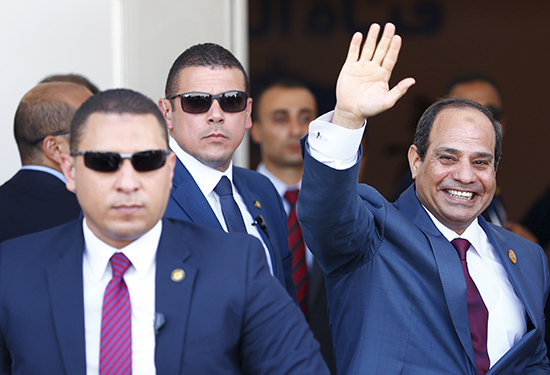Ahmed Farouk was arrested at Cairo International Airport on October 31, 2016, when he tried to board a flight to Guangzhou, China, the Swiss Organization for the Protection of Human Rights reported.
Farouk was traveling to the Canton Fair, a trade event that he was invited to cover, his brother told Al-Sharq TV on March 28, 2017, speaking to the channel anonymously. In the same interview, Farouk’s brother said that though interrogators initially questioned the journalist about his work on unrelated topics, the journalist was eventually jailed pending trial on suspicion he played a role in the broadcast of tapes purportedly featuring Egyptian President Abdel Fattah el-Sisi in conversation with military leaders when he was minister of defense under former President Mohamed Morsi, whom he wrested from power in 2013.
Farouk has not been formally charged in the case, known publicly as the “Mekameleen Leaks,” in reference to the Arabic-language, Turkey-based, pro-Muslim Brotherhood satellite television station that broadcast the tapes, his brother told Al-Sharq. Farouk denies any connection to the leaks, according to both the brother and the Swiss Organization for the Protection of Human Rights. His brother told Al-Sharq that the journalist was not aware that he was named in the case.
All other suspects in the Mekameleen Leaks case were released in July 2015, months before Farouk’s arrest, according to the Association for Freedom of Thought and Expression, an Egyptian human rights group.
Over the first half of 2015, Mekameleen aired a series of audio recordings that the channel claims to have obtained from sources in el-Sisi’s office. The leaks, which were purportedly recorded in 2013, seem to feature el-Sisi and military leaders discussing monetary aid from Gulf countries, Egyptian cooperation with the United Arab Emirates in sending arms to eastern Libyan strongman Khalifa Belqasim Haftar, and journalists who worked closely with el-Sisi. The government dismissed the leaks as fake, according to news reports, but forensic analysis published by international news outlets suggested they were authentic.
Farouk owns a London-based production studio, Pro Makers. In February 2016, a few months before his arrest, Farouk had produced a video report for the London-based channel Al-Araby TV alleging that an Egyptian food company violated hygiene standards. In December 2015, he also produced a 30-minute documentary featuring interviews with young female activists sent to trial in a case publicly known as the “7 a.m. movement.” The activists, whose ages were between 15 and 22 at the time, were arrested on the morning of October 31, 2013, for protesting the ouster of Mohamed Morsi, according to a statement by Amnesty international and news reports. The defendants were all sentenced first to 11 years in prison, then were given a suspended sentence of one year in prison after appeal, according to news reports.
In a blog post published by Al-Jazeera in September 2016, Farouk wrote about his experience of becoming a journalist in Egypt. After Morsi’s 2013 ouster, his belief in the importance of journalism made him shut down his biomedical business to become a video journalist, at a time when “only God knows” how difficult it is to be one, he wrote.
[EDITOR’S NOTE: The text has been updated in the sixth paragraph to reflect the date that Al-Araby TV published Farouk’s report.]
